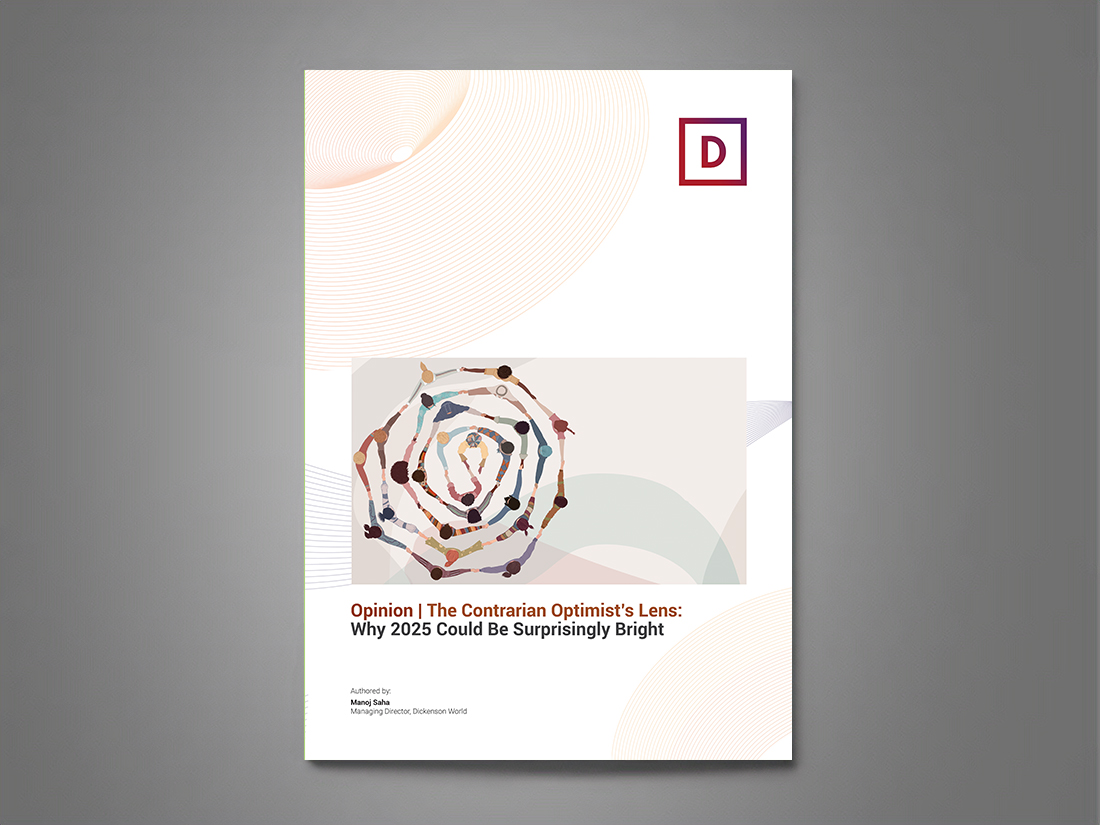Opinion | The Contrarian Optimist’s Lens:
Why 2025 Could Be Surprisingly Bright
In an era where pessimism often dominates discourse, adopting a contrarian yet optimistic perspective can unveil unexpected opportunities. The global landscape, marked by geopolitical tensions and economic uncertainties, may seem precarious. However, history demonstrates that periods of turmoil frequently precede significant advancements. As we approach 2025, there is a compelling case for anticipating positive transformations that could reshape the global order and economic paradigms. This analysis delves into potential de-escalations in geopolitical conflicts, innovative economic policies, and the pivotal role of Investor Relations (IR) in navigating and capitalizing on these developments. By examining these facets, I aim to provide a nuanced understanding of why 2025 could defy prevailing expectations and emerge as a year of remarkable progress.
Navigating the Rubicon: From Geopolitical Fractures to Stability
The geopolitical headlines of recent years have been saturated with tales of unrest: the protracted Russia-Ukraine conflict, the escalating tensions in the Middle East, the unraveling of Syria, and the persistent specter of U.S.-China rivalry. Yet history suggests that seemingly insurmountable crises often precipitate transformative breakthroughs. Could 2025 usher in an era of geopolitical stabilization that surprises even the most skeptical observers?
Consider the potential for de-escalation. A ceasefire in Ukraine, increasingly more probable when Trump assumes office, could gain traction as economic fatigue sets in among key stakeholders. Russia’s constrained resources and Europe’s imperative to normalize energy markets could catalyze pragmatic diplomacy. Similarly, renewed U.S. involvement in brokering Middle East peace might shift the narrative from conflict to reconstruction. Such breakthroughs would ripple across global markets, stabilizing energy prices and injecting confidence into economies beleaguered by inflationary pressures.
But stabilization alone isn’t the entire story. The rebuilding of war-torn regions could spur massive investments in infrastructure, creating opportunities for multinational corporations in construction, technology, and logistics. Moreover, supply chain diversification—accelerated by earlier crises—might yield innovation hubs in emerging markets such as Vietnam, India, and Africa. This reconfiguration could redefine globalization, making it more resilient and inclusive.
For Investor Relations (IR) professionals, these shifts offer fertile ground. Improved geopolitical conditions would allow companies to pivot from crisis management to growth narratives. Highlighting exposure to reconstruction projects and supply chain innovations could attract ESG-focused funds, enabling IR teams to reframe their organizations as engines of stability and progress.
“If history is any guide, crises often sow the seeds of renewal. And 2025, against all odds, might just be the year when the world begins to reap the benefit.”
Economic Renaissance: Unraveling the Surprising Potential of Policy Shifts
On the economic front, 2025 could be the year when the world’s policy pendulum swings towards cooperation. Recent signs of thawing trade relations between the U.S. and China may hint at broader multilateral engagements. Whether through a revival of trade pacts akin to the Trans-Pacific Partnership (TPP) or a recalibration of existing tariffs, such developments would rejuvenate global commerce.
Emerging markets, particularly India, are poised to capitalize on this pivot. With its demographic dividend and burgeoning digital economy, India could emerge as a standout performer in the global growth matrix. Simultaneously, developed economies may focus on green energy and technological self-reliance, spurred by the lessons of pandemic-era supply disruptions. Breakthroughs in semiconductors, AI, and renewables are likely to anchor new growth cycles.
For IR professionals, these macroeconomic tailwinds translate into tangible opportunities. Companies can showcase their alignment with transformative trends such as clean energy transitions or technological advancements. As global capital seeks returns in high-growth sectors, IR teams can expand shareholder bases, attract institutional investors, and elevate corporate valuations.
India’s Economic Slowdown: A Prelude to a 2025 Resurgence
India’s economic performance in 2024 has exhibited signs of deceleration, with GDP growth moderating to 5.4% in the July-September quarter—the most subdued expansion in seven quarters. This downturn is largely attributed to a contraction in manufacturing output and a discernible weakening in consumer demand. Political dynamics, notably a curtailment in infrastructure spending amid impending national elections, have further compounded the economic lethargy.
However, this slowdown could be quite transient, with a robust rebound in 2025 in the making. Post-election, it is expected that the government will reinvigorate infrastructure investments, thereby catalysing economic activity and generating employment opportunities. Concurrently, a moderation in inflationary pressures, particularly with a decline in food and commodity prices, is poised to enhance consumer purchasing power, thereby invigorating private consumption—a pivotal component of GDP.
On the global front, as international markets stabilize, the demand for Indian exports could ascend, bolstering the manufacturing sector and contributing to overall economic growth. Moreover, as already seen, the Reserve Bank of India may adopt accommodative monetary policies, such as reducing interest rates, to spur investment and consumption.
Collectively, these factors are anticipated to propel India’s GDP growth to approximately 6.6% in the fiscal year 2025, reaffirming the country’s position as one of the world’s fastest-growing major economies.
The Broader Implications for IR: Building Narratives of Resilience and Vision
The optimistic scenarios for 2025 underscore the importance of adaptability. Companies that navigated past disruptions with foresight are now positioned to lead. For IR, this is a moment to craft compelling narratives that emphasize resilience, strategic pivots, and alignment with emerging global trends.
Consider reputation building: improved geopolitical and economic conditions allow IR teams to underscore how their organizations weathered the storms of uncertainty. Enhanced valuations, driven by renewed investor confidence, further bolster these narratives. Additionally, optimistic scenarios often amplify retail investor participation, requiring IR professionals to tailor messaging for a broader audience.
The ESG dimension cannot be overlooked. Stabilization in conflict zones and trade relations often ties directly to sustainability. Reconstruction efforts and investments in green infrastructure offer IR teams a unique platform to align corporate strategies with global sustainability goals, enhancing appeal to ESG-conscious stakeholders.
Seizing the Upside of Uncertainty
While the challenges of 2025 remain daunting, the world has a track record of defying worst-case scenarios. Geopolitical de-escalations, economic policy shifts, and technological breakthroughs could collectively surprise even seasoned analysts with their transformative potential. For IR professionals, the horizon may actually be ripe with possibilities to redefine narratives, strengthen stakeholder trust, and position their organizations as architects of a brighter global future.
If history is any guide, crises often sow the seeds of renewal. And 2025, against all odds, might just be the year when the world begins to reap the benefit.
Contact Us: To learn more or schedule a consultation, please reach out to us at www.dickensonworld.com
Email:enquiry@dickensonworld.com.
About the Author
With over 25 years of experience in corporate finance and a deep-rooted understanding of ESG imperatives, Manoj Saha brings a wealth of knowledge to the discourse on corporate governance. Educated in the UK in Accountancy & Finance, he has dedicated his career to guiding organizations through the intricacies of financial management and stakeholder engagement across global markets, including India, the USA, the UK, and the Middle East and North Africa (MENA) region.

Opinion | The Contrarian Optimist’s Lens
To download and save this article.
Authored by:
Manoj Saha
Managing Director, Dickenson World
Visit www.dickensonworld.com to learn more about our services and how we can help streamline your corporate reporting process.


Leave A Comment